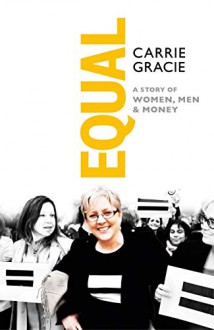
[I received a copy through NetGalley, in exchange for an honest review.]
A very interesting book in many ways, that also takes into account difficulties experienced by more women than just the author herself.
Carrie Gracie is/was obviously in what I’m going to call a “position of power” when this happened to her—in spite of not having equal pay, she still had very high pay (the kind of pay a high majority of people don’t and will never relate to), and in itself, this probably doesn’t invite readers in general to, well, relate (a.k.a “cry me a river, at least you’re not on a zero-hour contract). And I agree that this may easily lead readers, myself included, to see such reads as indeed interesting, but also too far away from most people’s daily reality.
This said, Gracie acknowledged this, and also definitely have a point when she states that, because of her advantages here, she was in a position to raise a dint about pay inequality problems, where women in more precarious jobs, earning much less and unable to get any kind of legal counsel (not to mention representation), wouldn’t have any other choice than either shut up or get fired, and probably end up in very dire straits. And -that- is without a doubt part of the problem: there’s still (too) much pressure applied on women, in too many places, when they don’t have the resources to push back, when even finding information about how to start pushing back is not easily available. If the ones who have enough resources to push back don’t do it, who is left?
After the list of the highest paid BBC employees was made public, Gracie wasn’t the only one who had concerns and was not just a little annoyed at what it revealed. Very interesting were the various “arguments” raised to justify why, as China editor, she didn’t earn as much as the (male) USA editor, such as suddenly mentioning that she was “in development” (after 3 years on the job?) when that had never been raised before. I don’t know how good (or not) she was at the job, but this should definitely not come out of the blue, “what a coincidence”, just after one demands equal pay. In the same way, sure, a company can justify higher salaries being paid to men because they’re more senior in their jobs—but that also begs the question, how come that, “what a coincidence”, those senior roles are still so often offered to (white) men? Obviously, when things are skewed in such a way, then yes, sure, “these salaries are higher.”
It was good to see, too, that many other women at the BBC took part in pushing back. Not all of them had the same resources as Gracie, but they worked together nonetheless to get things to progress. The book clearly acknowledges this, and also delves a little deeper into examples of what can happen in a workplace that tries to hide its pay inequality, how to recognise the signs, how to start the process to fight against it (for instance, the BBC didn’t want Gracie’s statements to be recorded, which led to many times rewritten transcripts—and a lot of wasted time—so this is something to keep in mind). Other examples highlight what men can do to help as well, all the more when they’re themselves in high positions, with high pay, but not only: anyone, at any level, can be an ally. Same for employers.
I’m not always sure about all the figures cited—I admit I didn’t cross-check absolutely everything, and sometimes it’s not always clear what exactly was taken into account (all jobs in a company, regardless of what they are? Or all jobs at the same level in a company?). The advice mentioned is also specific to the UK, so I’m not sure how useful it is for other countries. But at least it provides a basis, which is a good thing.

 Log in with Facebook
Log in with Facebook 





